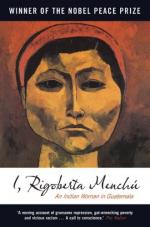|
This section contains 1,702 words (approx. 6 pages at 300 words per page) |

|
SOURCE: Salazar, Claudia. “Rigoberta's Narrative and the New Practice of Oral History.” Women and Language 13, no. 1 (fall 1990): 7–8.
In the following review of I, Rigoberta Menchú, Salazar argues that the autobiography's language both disrupts and challenges typical political dichotomies.
In the context of the Third World, women's autobiographical texts have become an integral part of the intellectual, ideological, political (and even armed) struggle waged by illiterate and silenced people against the powers of repressive states and elitist groups such as the landowning aristocracy and the industrialist bourgeoisie. In what follows I will make a close reading of one of these texts in an attempt to analyze the ways in which, from a feminist standpoint, it directly and indirectly addresses and transgresses Western imposed dualism such as the relationships between text/context, personal/political, public/private, knower/known, morality/literacy, and high/low culture.
I … Rigoberta Menchú (edited by Elizabeth...
|
This section contains 1,702 words (approx. 6 pages at 300 words per page) |

|


